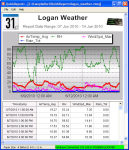
ドキュメント
カタログ
よくある質問
ソフトウェアに関するよくある質問の数: 6
すべて展開すべて折りたたむ
-
いいえ。当社の一部のアプリケーションで使用される libexpat.dll モジュールは、スパイウェア対策プログラムによってスパイウェアとして識別されることがあります。これはオープン ソースの XML パーサーであり、スパイウェアではありません。
-
はい。LoggerNet for Linux (LNLinux) を使用すると、LoggerNet サーバを Linux コンピューターで実行できます。LoggerNet サーバはデータを収集して保存し、ネットワークのセットアップと管理は、LoggerNet Remote を実行している Windows コンピューターから簡単に処理できます。または、かなり面倒ですが、Linux コンピューターで Cora Command を使用して処理することもできます。
-
無料のオプションには、PC400、Device Configuration Utility、LoggerLink などがあります。データロガーが Ethernet over USB をサポートしている場合は、Campbell Scientific ソフトウェアを必要とせずにブラウザ経由で接続できます。詳細については、「New Ethernet over USB Functionality for Data Loggers(データロガー用の新しい Ethernet over USB 機能)」ブログ記事をお読みください。
-
ブログ記事「ソフトウェアのアップグレード、パッチ、トライアルの世界をナビゲートする方法」では、パッチ (無料) とアップグレード (有料) の違いについて説明しています。次の例では、アップグレードとパッチの違いを簡単に示しています。
アップグレード パッチ 1.3から2.0などのメジャーバージョンの変更
1.3から1.4などのマイナーバージョンの変更
通常、有料での購入が必要
無料
-
Transformer は LoggerNet 3.2 以降で利用できます。
- Windows のスタート メニューから、LoggerNet3.0 | Utilities | Transformer に移動します。
- LoggerNet 4.x では、LoggerNet のメイン ウィンドウから、Program | Transformer に移動します。
-
ソフトウェアの新しいバージョンがリリースされると、そのソフトウェアのユーザーは、現在所有しているライセンスに応じて、無料のパッチまたは割引価格でのアップグレードを受ける権利が与えられます。
- パッチは、新しいリリースと同じメジャー リビジョン番号を持つソフトウェア バージョンのライセンスを現在所有しているユーザーに提供されます。たとえば、ユーザーがソフトウェアのバージョン 1 を所有していて、バージョン 1.1 がリリースされた場合、ユーザーは当社の Web サイトからパッチを無料でダウンロードできます。
- アップグレード価格は、新しいリリースとは異なるメジャー リビジョン番号を持つライセンスを所有しているユーザーに提供されます。たとえば、ユーザーがソフトウェアのバージョン 1 を所有していて、バージョン 2 がリリースされた場合、ユーザーは割引価格でアップグレードを購入できます。
Privacy Policy Update
We've updated our privacy policy. 詳細はこちら
Cookie Consent
Update your cookie preferences. クッキーの設定を更新する




